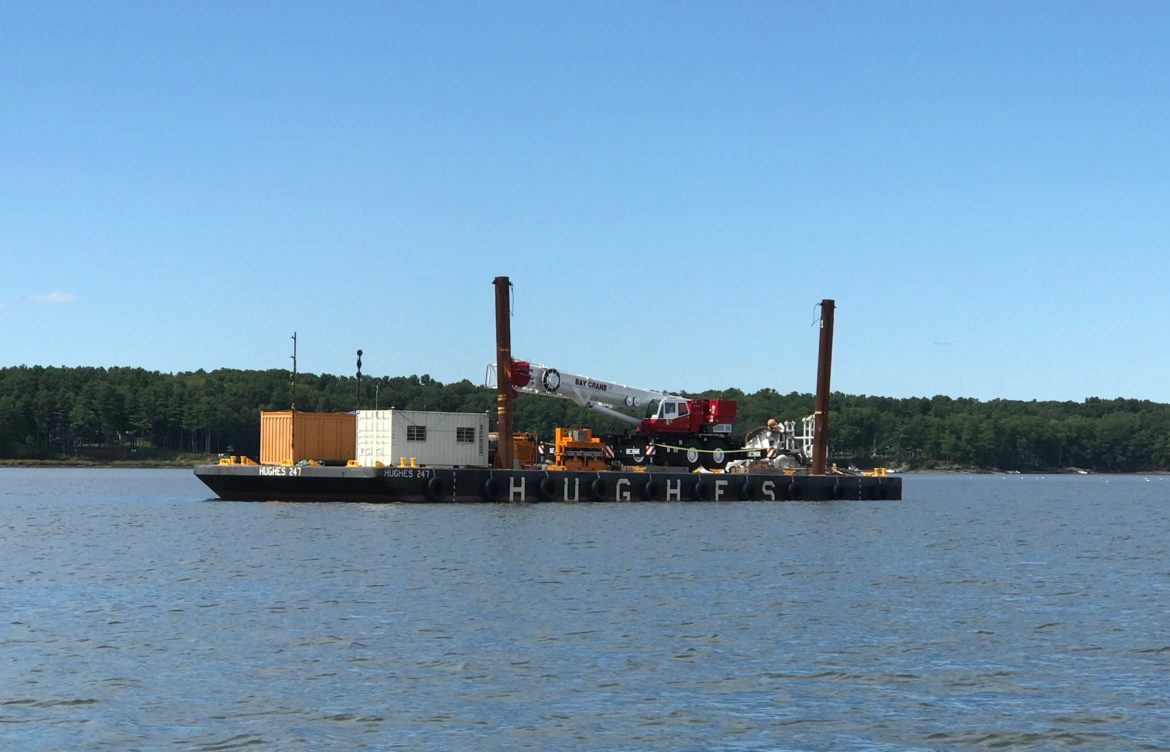By NANCY WEST, InDepthNH.org
CONCORD – U.S. District Court kept the lights on a little later Friday as a Conservation Law Foundation expert testified that Monday’s trial run of the jet plow method of burying cable along the bottom of Little Bay would constitute a major “pollution event.”
An Eversource expert countered saying he has never seen a problem with the jet plow burial method as Eversource readies to build the $84 million, 13-mile Seacoast Reliability Project from Madbury to Portsmouth.
Judge Joseph Laplante denied CLF’s motion for preliminary injunction to stop Eversource from holding Monday’s trial run just before 6 p.m., but said the ruling was limited to the jet plow portion of the motion, adding he expects the parties will return in the coming weeks to argue the whole project.
Testifying for CLF, Stephen Jones, a research associate professor at the University of New Hampshire, called the Great Bay estuary a “national treasure” and insisted he has always believed the jet plow testing alone would cause major pollution as it stirs up sediment at the bottom along the one-mile stretch where the line will cross Little Bay. Jones testified he is concerned about the oyster farms, estimating there are 20 to 25 commercial farms along Little Bay.
“This will be a significant pollution event,” Jones said. The jet plow burial will disturb the sediment that has collected viruses, nitrogen, heavy metals and other pollutants best left undisturbed, he said.
Testifying for Eversource, Payson Whitney, Vice President, Water & Coastal Engineering at ESS Group, said he has been involved in more than 20 similar projects using the jet plow method and under questioning by Judge Laplante said he has never seen a problem or a motion similar to the one filed by the Conservation Law Foundation.
Whitney said the Department of Environmental Services will review the data from Monday’s test run and construction is slated to begin 21 days later.
CLF experts said the jet plow trial run would cause irreparable harm to the environment and to people, but Laplante disagreed.
“Irreparable harm. I just don’t see it in this case,” Laplante said after a long day of testimony that took several twists and turns. Noting the lawyers for Eversource and CLF had a long day, Laplante said he would be in touch with them soon to see what the next step will be.
Laplante was taken aback during the mid-afternoon testimony of Sara Allen of Normandeau Associates testifying for Everesource. CLF attorney Lisa Wade asked Allen why the reports said “draft” on them and asked when they were finalized.
The final plan was approved by the Department of Environmental Services “this morning” and had been submitted the night before at 10 p.m., Allen said. Laplante wasn’t aware there was a new final plan. Until that question, CLF wasn’t aware of the new final plan, either.
Laplante asked Eversource attorney Barry Needlemen if he was aware of it and he said no. Laplante mentioned the apparently “cozy” relationship with the Department of Environmental Services.
CLF argues the U.S. Army Corps of Engineers issued its permit for the Seacoast Reliability Project relying on state data and didn’t do its own due diligence.
The state Site Evaluation Committee approved the project noting it is a reliability project in December, one that is required to meet the Seacoast’s growing electricity demands.
Durham Town Councilor Wayne Burton said the town has already reached a settlement with Eversource, one that he disapproved of. He praised Laplante for asking many questions, ones that Burton believed were overlooked by state officials.
Kaitlyn Woods, Eversource Energy’s spokesman, said the company is deeply committed to the ecological health of Little Bay.
“And has been working closely with the Army Corps of Engineers, the N.H. Department of Environmental Services and many other stakeholders to ensure that our jet plow method of installing the transmission cable in the sediment of Little Bay will not contaminate the water. We completed extensive sediment testing that detected no harmful levels of contaminants, and our jet plow trial will follow rigorous requirements from the Department of Environmental Services. Additionally, our jet plow trial will be overseen by an independent monitor.
“The Seacoast Reliability Project is imperative to providing Seacoast residents and businesses with the power they depend on, and we will continue to work closely with the Department of Environmental Services to ensure that it is completed in a way that does not have an adverse impact on the health of Little Bay.”





